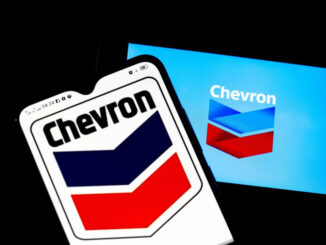
Home Fossil Energy Chevron, ExxonMobil, BP and Shell among highest bidders in Gulf of Mexico oil & gas lease sale
The U.S. government agency Bureau of Ocean Energy Management (BOEM) has held an oil and gas lease sale for acreage in federal waters in the Gulf of Mexico under the Biden administration, gathering nearly $264 million in high bids. Four oil majors – Chevron, ExxonMobil, BP, and Shell – submitted the biggest chunk of high bids during the lease sale.
Illustration; Source: BOEM
This comes after the Bureau of Ocean Energy Management published a final notice to hold the next offshore oil and gas lease sale for acreage in the Gulf of Mexico in February 2023, after announcing in January 2023 that it had prepared a Final Supplemental Environmental Impact Statement (EIS) for two Gulf of Mexico oil and gas lease sales – 259 and 261 – to comply with the Inflation Reduction Act of 2022.
BOEM’s announcement followed a Draft Supplemental EIS from October 2022 when BOEM disclosed the next steps for oil and gas leasing on the Outer Continental Shelf (OCS), including a proposed sale for the Gulf of Mexico region and completion of an environmental review for Cook Inlet, offshore Alaska. The Inflation Reduction Act mandates lease sales 259 and 261 to be held no later than 31 March 2023 and 30 September 2023, respectively. To comply with this, BOEM held Lease Sale 259 on 29 March 2023.
Within the results for this lease sale, the Bureau of Ocean Energy Management revealed that Gulf of Mexico Lease Sale 259 generated $263,801,783 in high bids for 313 tracts covering 1.6 million acres in federal waters of the Gulf of Mexico. This lease sale offered approximately 13,600 unleased blocks, around 73 million acres, in the Gulf’s Western, Central and Eastern Planning Areas.
BOEM explains that a total of 32 companies participated in the lease sale, submitting $309,798,397 in total bids. Leases resulting from this sale will include stipulations to mitigate potential adverse effects on protected species and to avoid potential conflicts with other ocean uses in the region.
The top ten companies based on the sum of high bids submitted were Chevron (75 high bids), BP Exploration & Production (37 high bids), Shell Offshore (21 high bids), Equinor Gulf of Mexico LLC (16 high bids), ExxonMobil Corporation (69 high bids); Beacon Offshore Energy Exploration LLC (13 high bids), Anadarko US Offshore LLC (13 high bids), Hess Corporation (12 high bids), Murphy Exploration & Production Company (6 high bids), and Woodside Energy (Deepwater) Inc. (12 high bids).
According to the government agency, revenues received from offshore oil and gas leases – including high bids, rental payments, and royalty payments – are directed to the U.S. Treasury, certain Gulf Coast states – Texas, Louisiana, Mississippi and Alabama – and local governments, the Land and Water Conservation Fund and the Historic Preservation Fund.
Lease sale sparks environmentalists’ ire
Earthjustice describes Lease Sale 259 as one of the largest offshore lease sales in U.S. history, as it offered up “almost all of the available unleased areas” in the Western and Central Gulf of Mexico, which could result in the production of over 1 billion barrels of oil and 4 trillion cubic feet of natural gas over the next 50 years.
The environmental group claims that even though the IRA directs BOEM to hold the lease sale, it does not require “such a vast area” to be auctioned to industry, nor does it exempt the sale from any existing laws for the protection of people and the environment, including the National Environmental Policy Act (NEPA).
As oil companies have raked in high profits over 2022, Earthjustice said they were well-positioned to bid on leases. However, Gulf community and environmental groups filed a federal court legal challenge to the Department of the Interior’s Lease Sale 259 earlier in the month. This complaint states that DOI did not consider “the health hazards the offshore lease sale will cause for Gulf communities, nor the grave climate impacts of such a massive new source of fossil fuel development and how it will threaten endangered marine life.”
George Torgun, Earthjustice attorney, remarked: “The excessive and reckless scope of today’s oil and gas lease sale demonstrates how badly our federal leasing programme needs reform. The Biden administration is not only holding a lease sale that is at odds with the law — but also succumbing to the wants of a profit-rich industry over the well-being of Gulf communities, vital ecosystems, and our urgent climate goals.”
Furthermore, Earthjustice points out that the United Nations in its latest IPCC report put the emphasis on the vital need to accelerate the phasing out of fossil fuels everywhere. The report warns that the window of opportunity in which significant changes can be made will close in seven years. Meanwhile, the group underlines that Lease Sale 259 will lock in fossil-fuel extraction in Gulf waters for the next half-century.
“With the egregious and unnecessary scope of Lease Sale 259, the Biden administration is directly contradicting its commitment to reduce greenhouse gas emissions and transition to clean energy,” says Earthjustice.
The environmental group also notes that the lease sale is being held weeks before the 13th anniversary of the Deepwater Horizon disaster, with oil spills remaining “a perpetual source of concern” in the wake of that tragic event while the likelihood of climate change causing more powerful hurricanes “only increases the risk of future deepwater drilling disasters.”



